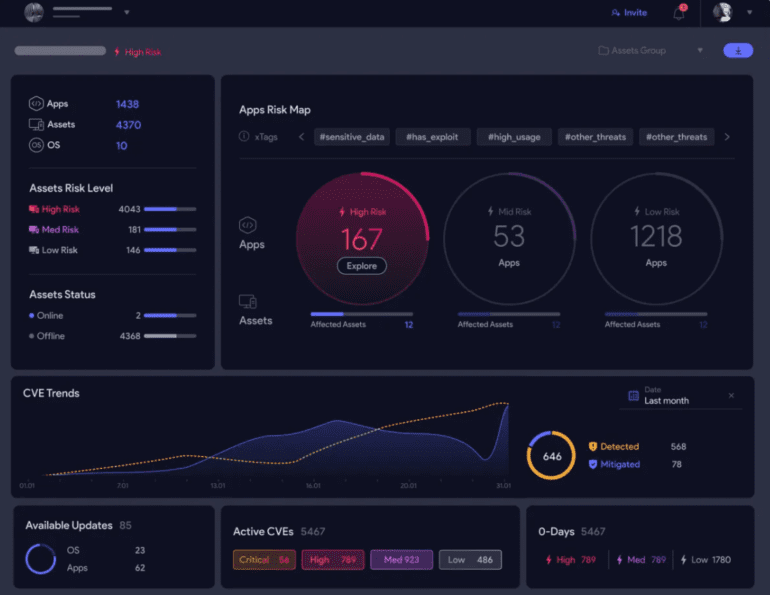TL;DR:
- Vicarius, a vulnerability remediation platform, raises $30 million in a Series B funding round.
- The funding round, led by Bright Pixel Capital, values Vicarius at double its previous worth.
- Vicarius’ AI tool, vuln_GPT, aids in creating system breach detection and remediation scripts.
- The company has witnessed remarkable 5x year-over-year growth and boasts a customer base of over 400 brands.
- Vicarius plans to use the funds to advance its product roadmap and expand its team.
- Their unique approach automates discovery, prioritization, and remediation tasks for security and IT teams.
- Vicarius also fosters a community of security vulnerability researchers who contribute to their AI tool.
- The company aims to expand into new markets, including Asia Pacific, while strengthening its presence in North America and Europe.
Main AI News:
In the fast-evolving landscape of generative AI, the emergence of “copilots” for cybersecurity has taken the industry by storm. Major players like Microsoft and Google have already joined the race, and now, Vicarius, the renowned vulnerability remediation platform, has unveiled its latest innovation – vuln_GPT, a text-generating AI tool designed to streamline the creation of system breach detection and remediation scripts.
What sets Vicarius apart is not just its cutting-edge technology but also its remarkable growth trajectory. With a staggering 5x year-over-year growth rate, the company has attracted substantial attention from investors. Vicarius can proudly count over 400 leading brands, including industry giants like PepsiCo, Hewlett Packard Enterprise, and Equinix, among its satisfied clientele.
In a recent development, Vicarius has successfully secured a $30 million Series B funding round, spearheaded by Bright Pixel Capital, and featuring notable participation from AllegisCyber Capital, AlleyCorp, and Strait Capital. This funding round has catapulted Vicarius to a valuation twice its previous worth, a figure discreetly held by the company’s CEO, Michael Assraf. With a cumulative funding of approximately $56.7 million, the lion’s share is earmarked for advancing Vicarius’ product roadmap and scaling its workforce, which currently stands at 43 dedicated professionals.
Michael Assraf, the Co-founder and CEO of Vicarius, elucidates the company’s mission, stating, “Vicarius automates much of the discovery, prioritization, and remediation workload plaguing security and IT teams. An early adopter of product-led growth, Vicarius’s self-service model changes the cybersecurity solution buyer’s paradigm by letting customers transparently test and find value … before purchasing.”
Vicarius was founded several years ago by Assraf, along with co-founders Yossi Ze’evi and Roi Cohen. Their vision was clear – to tackle the rising threat of cyberattacks that exploited common “building” blocks. These building blocks are none other than third-party and operating system APIs provided by software and operating system-compiled libraries. Vicarius set out to build an intelligent permission manager for system-level APIs, ushering in a new era of cybersecurity.
Today, Vicarius boasts an impressive track record of analyzing apps for vulnerabilities and promptly alerting customers to potential threats. In cases where patches are unavailable, Vicarius deploys what Assraf refers to as “in-memory protection,” a method aimed at securing the app without necessitating a software upgrade, although some skepticism lingers within the industry.
Additionally, Vicarius extends an invitation to a community of security vulnerability researchers, allowing them to collaborate and share remediation and detection scripts. Researchers are rewarded with a virtual currency for their contributions, and Vicarius leverages this collaborative effort to enhance its vuln_GPT tool. It’s worth noting that all AI-generated scripts undergo thorough validation before reaching Vicarius’ customers, who can provide feedback through a dedicated module.
Assraf asserts, “We wish to emphasize that Vicarius is looking to lead AI-based vulnerability remediation at any stage, from detection to prioritization to proactive remediation.”
Vicarius sets its sights high, with plans to empower security researchers in its community to utilize their virtual currency for product acquisition, launch educational courses, and seamlessly integrate the Vicarius platform with established ticketing systems like ServiceNow and Jira. The company also harbors ambitions to expand its footprint, particularly in the Asia Pacific region, while further solidifying its presence in North America and Europe.
As Assraf aptly summarizes, “For years, enterprises have been struggling with deploying vulnerability management processes that require too many tools and create too many alerts and too much work for overburdened security teams. While most security processes advanced one or two generations, the vulnerability remediation cycle management lagged, exposing businesses to cyber risk. As a result, customers are looking for a single platform that consolidates, personalizes, and scales the vulnerability remediation process.“
Conclusion:
Vicarius’ successful funding round and impressive growth signal a growing demand for AI-powered cybersecurity solutions in the market. With an innovative approach that streamlines vulnerability management processes, Vicarius is well-positioned to make a significant impact in the cybersecurity industry, offering a consolidated and personalized solution to address the evolving cyber threats faced by enterprises.

